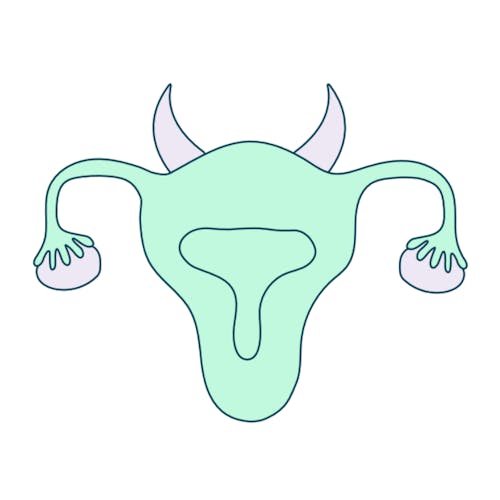This website uses cookies to enhance the user experience. By using Yoppie you are agreeing to our use of cookies.
Zinc for PMS: What it helps with and how to get more of it
Written by Yoppie
28 Jun 2022
What does zinc do in the body?
How can zinc help with PMS symptoms?
When is zinc most effective?
How do I know if zinc supplements are helping me?
How much should I be taking?
There are many supplements recommended to help with different symptoms that arise during your menstrual cycle, but one that’s rarely talked about is zinc, despite many studies concluding it can have positive benefits for those with troublesome PMS symptoms. Let’s take a look at why zinc is a star player in your body, how it’s connected to the menstrual cycle and PMS, and how much of it you need.
What does zinc do in the body?
Zinc is a vital mineral with several important functions, including the synthesis and metabolism of carbohydrates, lipids, proteins and other micronutrients. It’s key for cell and organ structure, development during pregnancy, and plays a role in DNA synthesis, immune function, wound healing and tissue repair. In short, it’s pretty darn important!
Around 60% of all zinc content in the body can be found in your skeletal muscle, and 30% in your bone mass, but the body doesn’t store it so daily intake of zinc is required to keep it at a healthy level. You’ll get zinc by consuming foods like red meat, poultry, crab, dairy products like cheese, wholegrain cereals, fortified breakfast cereals, pulses, nuts, legumes, and fun fact: oysters contain more zinc per serving than any other food, so slurp ‘em down!
While it’s typically best to address any vitamin or mineral deficiency with diet changes first, it should be noted some studies say getting zinc from food alone is unlikely to improve PMS symptoms, and zinc supplements are needed to experience real results in this area.
How can zinc help with PMS symptoms?
Onto the juicy stuff! According to a 2020 paper, zinc is thought to offer effective treatment options for conditions like PCOS, endometriosis, vaginal dryness, and even excessive period pain. In fact, one clinical trial found zinc supplements worked just as well as the pill for reducing period pain, by reducing inflammation and prostaglandins.
And it’s not just those with period pain that could benefit. Zinc supplementation has also been found to be an effective acne treatment by blocking androgens, killing bacteria and slowing sebum production. Another study looked at the effects of zinc supplements on sleep quality in people with PMS, and found that although it won’t have dramatic effects, if taken for 12 weeks it could have marginal benefits. And if you’re sleep deprived, even marginal benefits are worth exploring!
When is zinc most effective?
If you’re wondering when in your cycle it’s best to take zinc supplements, one study suggests zinc is lowest during the luteal phase of the cycle, compared to the follicular phase, and the same was found to be true for those who suffer from intense PMS symptoms. (Another reason to use the Learn Your Phase questionnaire on our website and find out what phase you’re in right now!)
How do I know if zinc supplements are helping me?
Studies have found inadequate intake of zinc through diet may be quite common around the world, so it’s not out of the question that you could require more zinc in your body. With many PMS-busting supplements or solutions, it’s all about trial and error, and understanding that taking one supplement won’t instantly make you feel better.
Some vitamins and supplements will show results within days, whereas others (well, most!) take around 3-6 weeks to see results. For this reasons, as a rule it’s best to take a new supplement for at least a month to see results, unless you start to notice adverse effects.
When improvements are mild, it can be difficult to notice a difference in your level of pain, your acne, sleep or other symptoms, but even a small improvement could be worth it. To notice any improvements, it’s best to track your current symptoms and perhaps give yourself a pain score in order to measure the benefits. After a month of taking supplements, check back in with your scores to see what’s changed.
How much should I be taking?
Zinc supplements are widely available and in the UK it’s recommended the daily zinc intake for an adult with a menstrual cycle is 7mg. The Department of Health in the UK warns against exceeding 25mg of zinc per day, and it’s important to note there is such a thing as zinc excess and zinc toxicity, so avoid taking more than the recommended daily amount.
If you’d like to benefit even more from this mineral and make sure it improves your PMS symptoms, our Hormone Hero and Super Soother supplements contain zinc and other amazing ingredients to help you tackle that time of the month!
Remember, our Learn Your Phase questionnaire can help you find out the best time to start taking your zinc supplements for PMS support. We love to help people tackle the symptoms associated with the entire cycle - not just the bleed days - so whatever your symptoms or cycle goals are, we’ve got you.
Got a question about zinc supplementation? Let’s chat over in our Full Stop FB group, or feel free to reach out to the team on IG at @itsyoppie so we can help.
Don't forget that our personalised menstrual cycle subscription box can get organic tampons, PMS supplements and much more delivered easily and regularly through your letterbox, to give you just a bit more peace of mind each cycle.
Section jump
Back to top
Subscribe To Our Newsletter
YOPPIE





© 2026 Yoppie is a registered trademark of Phlo Technologies Ltd.
Yoppie's supplements are not a substitute for a varied diet and healthy lifestyle and are not intended to diagnose, treat, or cure any disease. If you are pregnant, breastfeeding, have a medical condition or are under medical supervision, please consult with your doctor before taking any of our products.






